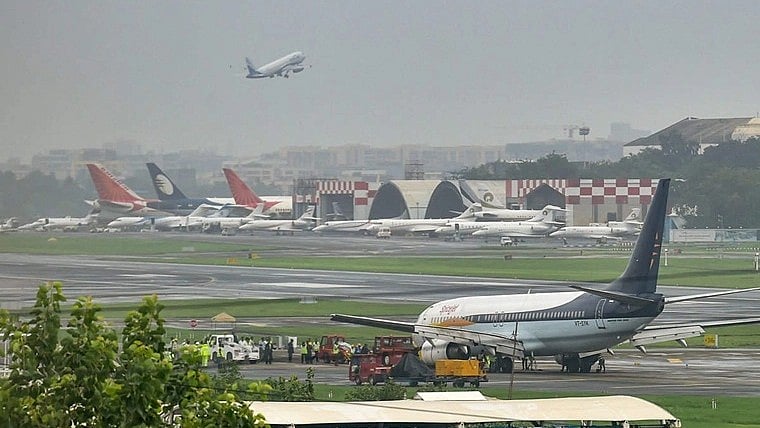Additional ATC staff deployed in Mumbai as Pakistan’s airspace closure diverts international flights | Representational Image
Mumbai: Pakistan’s decision to close the airspace for Indian aircraft has increased air traffic in Mumbai’s airspace. Although the impact of airspace closure is largely seen on flights from north India, Mumbai is also suffering indirectly due to air traffic congestion.
The recent terrorist attack in Baisaran valley in Kashmir’s Pahalgam has escalated diplomatic tensions between India and Pakistan. After India announced a series of restrictions against Pakistan, the latter also announced the closure of its airspace for Indian aircraft.
On Thursday, Pakistan’s civil aviation authority issued a notice to airmen (NOTAM) announcing that their airspace will be closed for Indian-owned and Indian-registered airlines till 5am on May 24.
This major announcement will substantially affect Indian airlines originating from Delhi’s Indira Gandhi International Airport and other northern cities, like Lucknow, Amritsar and Chandigarh, which are destined towards the West including Europe, United Kingdom, North America and West Asia.
These flights, which used to fly from above Pakistan, will now have to take longer routes from above the Arabian Sea, which will increase the operational costs with increased fuel consumption and payload limitations. Some of these flights on extended routes are expected to increase the travel time by 2 to 2.5 hours.
Indian Airlines Affected
Indian airlines including Air India and IndiGo have already announced that Pakisatan’s airspace closure has already affected them on several routes. Air India has announced that its flights to and from North America, UK, Europe, and Middle East will take an alternative extended route.
“Air India regrets the inconvenience caused to our passengers due to this unforeseen airspace closure that is outside our control. We would like to reiterate that at Air India, the safety of our customers and crew remains top priority,” said the airline. Air India will see the highest impact of this airspace closure as it operates the most long haul and ultra-long haul flights towards the West.
Similarly, IndiGo will also face issues on around 50 international routes which will require longer sectors, the airline told The Free Press Journal. It also said that it has cancelled the flights to Kazakhstan’s Almaty from April 27 and Tashkent from April 28 as the new routes are outside operational range of the airline’s current fleet.
“The international routes that will require longer sectors may be subject to some slight schedule adjustments. We regret the inconvenience caused to our customers and assure them that we’re looking at all options to minimise disruptions. We expect all our customers’ understanding as these are reasons beyond our control,” said a spokesperson from the airline.
Longer Detours To Increase Airfares
The increased operational costs for Indian airlines will also result in higher airfares for passengers flying to international destinations towards the West. However, the increase in airfare will be seen after a week or ten days after airlines assess the increase in their operational cost, believes tour operators.
Talking to The Free Press Journal, Rajiv Mehra, president of Indian Association of Tour Operators (IATO), said, “The flight from Delhi to Dubai is already taking 20 to 25 minutes longer than usual but it is too early to guess the change in airfare due to dynamic pricing. The rise in airfare will be clear in another week or ten days. However, those who have booked their tickets early will not have to pay any additional costs.”
In the recent past, Pakistan had closed down its airspace for several months after the Indian Air Force carried out airstrikes in Pakistan’s Balakot in February 2019 following the Pulwama terror attack. The decision had reportedly costed Indian airlines Rs700 crore due to higher operational costs.
Detours To Congest Mumbai Airspace
The flights will have to take longer detours southwards to Gujarat and Maharashtra from where they can turn right and fly above the Arabian Sea towards their destination in the West. Industry experts believe that a majority of the flights will travel over the Arabian Sea after passing through Mumbai’s airspace to keep a safe distance from Pakistani airspace. This is expected to increase congestion in Mumbai’s airspace.
These flights will have to be managed by the Mumbai Air Traffic Control (ATC) additionally apart from the regular flights that pass through its airspace. According to sources, Mumbai ATC will have to handle 120 additional flights daily. It has also deployed additional staff, specifically in its oceanic department to handle the aircraft flying over international waters.
An ATC official told The Free Press Journal, “Overflying has increased in Mumbai’s airspace especially during the night time. We have established a new narrow route where flights detour from Mumbai’s airspace towards Muscat and then progress towards their destination. We have deputed additional radar controller to manage these flights and have more on standby if need arises.”
